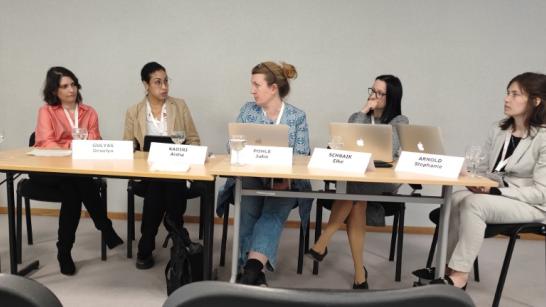
At the European Union in International Affairs (EUIA) conference, a panel of speakers provided on 3 May 2023 a critical assessment of EU digital sovereignty discourses and practices in an international context. The discussion was chaired by Jamal Shahin (VUB, Brussels School of Governance), while a review was provided by Julia POHLE (WZB) as the discussant.
Stephanie Arnold (University of Bologna) discussed the shaping of policies locally and globally in the context of the EU's twofold effect on the digital landscape. Digital development requires prerequisites for successful harnessing of its benefits; infrastructure, regulatory framework, and digital literacy. Two different approaches to digital development were considered: the Western approach which is human-centered and advocates universal internet access with strategic plans to attract investors, and the Chinese approach, based upon national interest and strategic priority, centred around promoting infrastructure projects.
Additionally, Arnold discussed the EU Digital for Development (D4D) complementary policy (2017) which was largely directed towards Africa, and was meant to supplement already existing EU development projects. However, even though the geographical focus is on Africa, there is a mismatch in funding levels as most of the funding is centred in Asia. The empirical analysis in Arnold’s research focuses on all recipients of development aid in the Global South and measures the ICT policy adoption in the macro region, compared to Africa.
Orsolya Gulyas (Brussels School of Governance) presented the conceptual link between competitiveness and sovereignty in the context of EU policy making. Digital development is increasingly tied to economic and foreign policymaking. Meanwhile, there is a rise of Cold War rhetoric amidst circumstances such as geopolitical tensions, fears of internet fragmentation, cybersecurity concerns and disinformation. Digital sovereignty rhetoric first started within more autocratic states such as China. In this context, the EU’s embrace of digital sovereignty discourse is surprising, due to the EU being a democratic political and economic union.
Gulyás further examined the digital strategies of the EU, the US and ASEAN in order to understand how sovereignty is conceptualized within different policy strategies. Her findings show that in global digital policy making, technological development and economic growth are seen as interchangeable. Economic agents are perceived as sensitive beings and humans are considered both sensitive and functional, while sovereignty is rooted in desire for control and independence. The presentation concluded with a discussion on European strategy for data, rooted in the presumption that data is the lifeblood of economic development, and the Global Gateway Strategy, where doublespeak creates issues around competitiveness and dependency.
Aisha Kadiri (Ecole Normale Supérieure) addressed the topic of imperial and worldly sovereignty in digital colonialism. Today, digital capitalism and the rise of surveillance economies are more easily visible. Digital colonialism was defined as the neocolonial power of Big Tech in the Global South, and the perpetuation of colonial structures, values, and powers. The concept of digital sovereignty is ambivalent, as there are different contexts and utilization of digital/data sovereignty. As such, digital sovereignty can be seen as an antidote to digital colonialism.
While in the Global South and Indigenous contexts, definition of sovereignty is formulated as an emancipatory concept, in the context of EU sovereignty it is related to competitiveness and economics. Kadiri aims to answer many questions, including what the role of sovereignty is in political spaces and what relationship does digital sovereignty have to power, all while defining the term sovereignty itself. How effective is digital sovereignty in countering extraction, domination, exploitation?
Elke Schraik (University of Vienna) discussed her aim to close a research gap in the context of the digital revolution as a global challenge, and the EU as a global digital actor with respect to the US and Africa. There are different implied values and norms within the global challenge of digital revolution. Schraik looks to understand the norms, interests, and demands within the context of the EU and Africa.
The division of operationalisation states that an actor’s goals can be based on norms or interests, depending on whether the goal is more environment focused or centred around self preservation (autonomy). The research results show that EU digital policy towards Africa has a prevailing development norm, with the interest being economic.
Julia Pohle (WZB) then expanded on different policy approaches and effects of EU policy making, further discussing global digital inequalities. The panel closed with a call for further research critically assessing on the EU’s digital sovereignty policy agenda.



